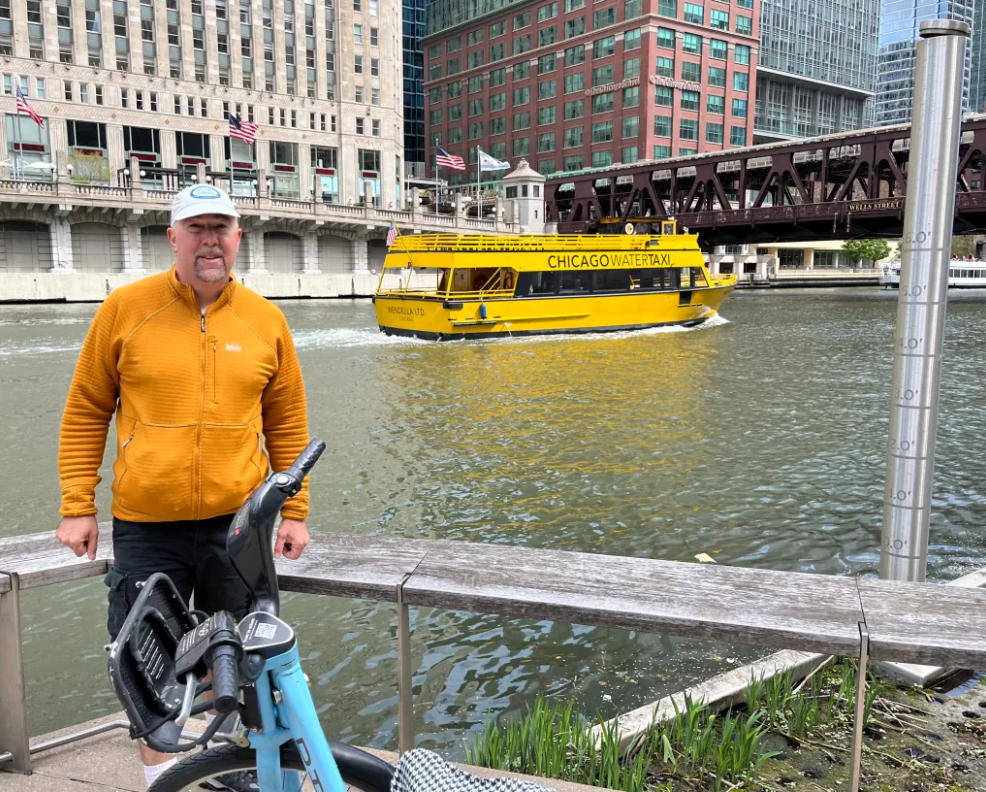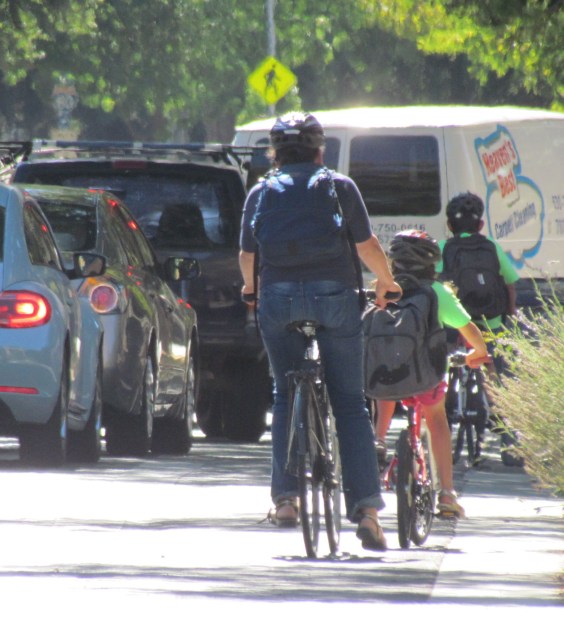A San Francisco Parking Enforcement Debate That Shouldn’t Be Happening
12:08 PM PDT on May 22, 2009
 Flickr photo: andreil
Flickr photo: andreil Why is San Francisco -- considered by many around the world to be a “progressive” and “green" city with a Transit First policy -- still debating whether to extend meter hours and parking enforcement, even in the face of a crippling Muni budget deficit? Didn't we merge Muni with the Department of Parking and Traffic precisely so policy decisions about management of the streets would benefit the operations of transit, bicycling, and walking?
Some politicians, including the Mayor, apparently can't stop viewing these issues from behind the wheels of their SUVs. They can't see past the myth that raising parking fees will drive away business, thus perpetuating an erroneous stereotype that most urban shoppers drive. My colleague Matthew Roth wrote a great piece debunking that popular fallacy, noting that the majority of shoppers don't drive to shop in areas like North Beach and that in aggregate, transit riders, cyclists and walkers spend more than drivers. Other cities that have managed street space in accord with Shoupian market-rate pricing and curbside vacancy targets, and have invested additional revenues in pedestrian and bicycle infrastructure improvements, have seen a rise in business, not a drop.
San Francisco could and should do the same, but the MTA -- namely its chief, Nat Ford, and its Board, all appointees who rarely act independently -- has bowed to pressure from the Mayor, and Supervisors Carmen Chu and Bevan Dufty and taken Sunday and evening parking enforcement until 10 p.m. off the table as a much-needed revenue measure to fund Muni. Instead, the MTA is going to study extending it to 8 p.m. Supervisor John Avalos and four of his colleagues on the Board want it penciled back in the budget. Supervisor Sophie Maxwell, who was on the fence, is coming around and might join other members of the Board of Supervisors next week in rejecting the MTA budget if Ford doesn't follow the recommendations of a "Transit Justice Package," and make some changes. As Supervisor David Campos has noted, asking for a $15 million readjustment is not a radical proposal.
Mayor Gavin Newsom, responding to a question from Streetsblog last
week, seemed stuck to his windshield perspective. When I asked him what
he thinks about the fact that Muni riders are taking a much bigger hit
than drivers in this year's budget, he responded: "Look at what we’ve
done in the last few years. There have been
dramatic increases in parking, fines and fees related to automobile
use. So, you have to look at the totality of the last few years and I
think assess it in proportion to what’s happened over the years."
Nonsense. How about the last decades? We've bent over backwards to accommodate cars and vehicle ownership while transit service has deteriorated calamitously.
We're supposed to be a Transit First city, but we're not taking
advantage of the enormous revenue opportunities that options like metered
enforcement represent, and we haven't raised meter rates since 2005. There are an estimated 320,000 on-street parking
spaces, of which only 25,000 are metered, and those metered spaces are
far from market-rate. If the average parking space is about 200 square feet, that amounts to roughly 60,000,000 square feet of real estate that we're giving away for free or next to nothing so people can store their private property in public. Of the 83,000 residential parking permits (RPP) doled out each year, we practically give them away for $74. How does that make any economic sense? We need to change the vehicle code that prevents the MTA from raising RPP rates, which are only priced at cost recovery (the amount to administer the program), and we need to charge a fee that approximates private lots and garages.
While SFPark is a great start at better
management of the curbside, it will apply to only 6,000 on-street spaces
and is not meant primarily as a revenue generator. The kind of change we need is sea change, a complete transition away from 60 years of externalizing the costs of car ownership. This kind of political leadership isn't coming from the top and seems fleeting among the majority of supervisors.
Chu and Dufty won't give in on their reticence. Chu, who gets around mostly by car, said in an interview earlier this year that she believes San Francisco has a parking shortage. Dufty was also feeling heat from the Mayor, but said he was also taking into account concerns from some Castro merchants. But really, if Chu wants available parking, she should back stronger market-priced meter enforcement. If Dufty wants more business in the Castro, he should back extended meter enforcement.
From Donald Shoup's book, "The High Cost of Free Parking":
"Market-priced curb parking will reduce traffic congestion, air pollution, and energy consumption caused by cruising and also make curb parking more convenient. Eliminating the need for off-street parking requirements will, in turn, reduce development costs, make the land market more efficient, and improve urban design. Finally, the revenue from curb parking will either improve public services or reduce taxes that distort the economy, or both."
Other cities have already done what the MTA originally proposed last month. Los Angeles, Long Beach, Glendale, Pasadena, Montreal and Princeton, New Jersey are examples of cities that have implemented parking enforcement on Sundays. Pasadena extends its evening meters to 12 a.m. on weekends, and 10 p.m. during the week. But in San Francisco? Most metering ends at 6 p.m.
 Source: SFMTA
Source: SFMTAMarilyn
Buchanan, chair of Pasadena's parking advisory committee, saw it this way: "This might seem silly to some people, but if not for our parking
meters, it's hard to imagine that we'd have the kind of success we're enjoying.
They've made a huge difference. At first it was a struggle to get people to
agree with the meters. But when we figured out that the money would stay here,
that the money would be used to improve the amenities, it was an easy sell."
If the MTA is going to truly be an independent agency, then Nat Ford needs to stand up to Gavin Newsom for once, putting aside his political loyalties. Don't study extending metering hours, just do it! Ford went along with these parking enforcement proposals in the first place. If he doesn't make these changes, we might have to go back to the voters and change the governing structure of the MTA to get the kind of Transit First city we all deserve.
Matthew Roth contributed to this piece.
Stay in touch
Sign up for our free newsletter
More from Streetsblog San Francisco
Streetsblog SF editor Roger Rudick offers constructive criticism of Chicago’s downtown bike network
"There were blocks that felt very safe and very secure," he said. "But then you're immediately – voom! – disgorged into three lanes of moving traffic with no protection."
Commentary: There is Zero Ambiguity to the West Portal Tragedy
What happened in West Portal was entirely predictable and preventable. The city must now close Ulloa to through traffic and make sure it can never happen again




